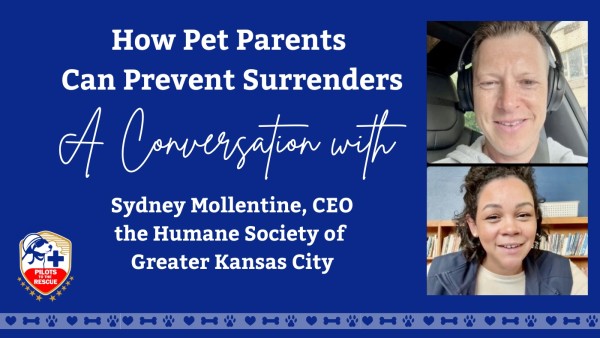I first got to know Sydney Mollentine when Pilots To The Rescue collaborated with the Humane Society of Greater Kansas City on a rescue mission last year. As someone who has worked in animal welfare for over 25 years, Sydney brings not just experience, but a deep understanding of what both pets and their people need to thrive.
Sydney joined me in a Facebook Live conversation recently and we chatted about everything from the real reason adoptions sometimes fail, to the powerful role community resources can play in keeping pets in loving homes. Highlights of our conversation are below.
Whether you’re a seasoned pet parent or thinking about adopting, this is a must-read.
The “3-3-3” Rule: Give Pets Time to Adjust
One of the biggest mistakes new adopters make is expecting their pet to settle in right away. Sydney explains a simple but essential concept: the 3-3-3 rule. Shelter pets need three days to decompress, three weeks to settle in, and three months to feel truly at home.
This timeline reminds us that pets—especially those coming from shelters—need time, patience, and support as they transition into a new environment. "Just like you’d be overwhelmed if someone dropped you into an unfamiliar home with unfamiliar routines, so are our pets. Give them grace,” says Sydney.
Prepare Before You Adopt
Adoption isn’t just a one-time event—it’s a commitment. Sydney encourages potential adopters to prepare before bringing a pet home. Know where your nearest affordable vet is, check out local doggy daycares, look into emergency clinics and food resources. When you’re proactive, you set yourself and your pet up for success.
In Kansas City, Sydney highlights two leading resources for affordable pet care: the Humane Society of Greater Kansas City and the Pet Resource Center. Both organizations are nonprofit and funded through donations and grants to keep care accessible.
There’s Help When Money Gets Tight
We’ve all seen it—families struggling to make ends meet, and pets often caught in the middle. Sydney reminds us that financial strain shouldn’t mean giving up a beloved companion.
“Pet food pantries exist all over Kansas City and many cities nationwide,” she says. “The last thing shelters want is for someone to surrender their pet because they can’t afford food.”
Sydney recommends that every pet owner create an emergency list just like you would for your kids or partner: your vet, a 24-hour clinic, and nearby pet food resources.
Behavior Issues? Don’t Give Up. Get Help.
Many surrenders happen because of behavioral problems. But as Sydney points out, most of these issues are completely manageable—with the right support.
“Most shelters, including ours, have behavioral support teams. If your new pet is struggling with crate training or separation anxiety, reach out.”
Once again, it goes back to the 3-3-3 rule. “Adjustment takes time. Don’t assume the behavior is permanent—assume the pet needs help feeling safe.”
If You Have to Surrender, You’re Not a Bad Person
Even with the best intentions, sometimes rehoming a pet becomes the best option. Sydney is passionate about removing the shame from surrender.
“If you’re making a choice based on what’s best for the animal, you’re doing something compassionate,” she says. “But we hope people can reach out earlier—before it gets to that point. That’s why community support is so critical.”
Why This Work Matters So Much to Her
Sydney’s journey in animal welfare began when she was just 13, volunteering at a local shelter. Since then, she’s worked in shelters across the country and now leads the Humane Society of Greater Kansas City—her hometown.
“I got into vet school but realized I wanted to help people as much as I wanted to help animals. This work lets me do both.”




 Request A Rescue
Request A Rescue